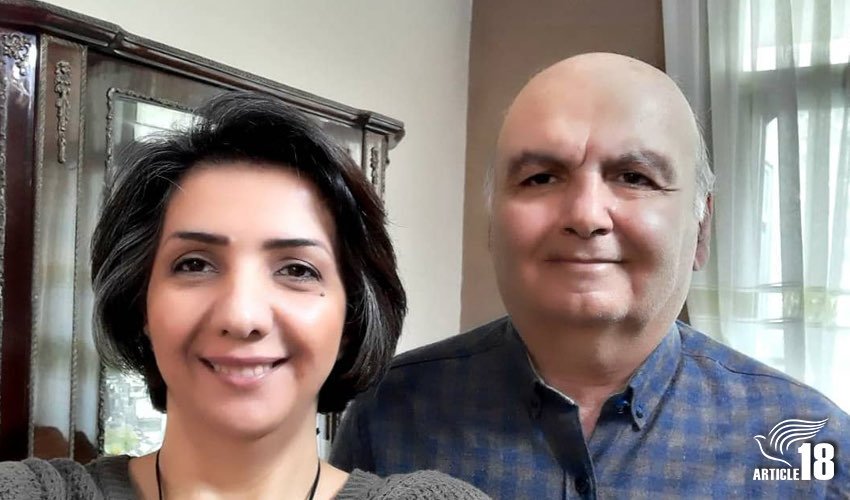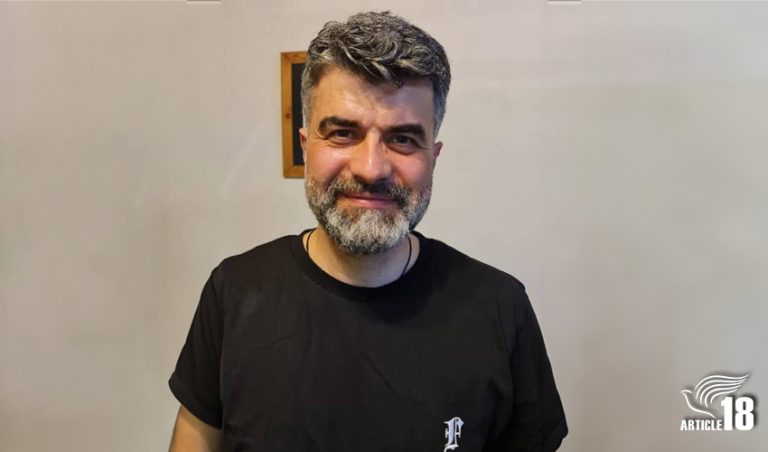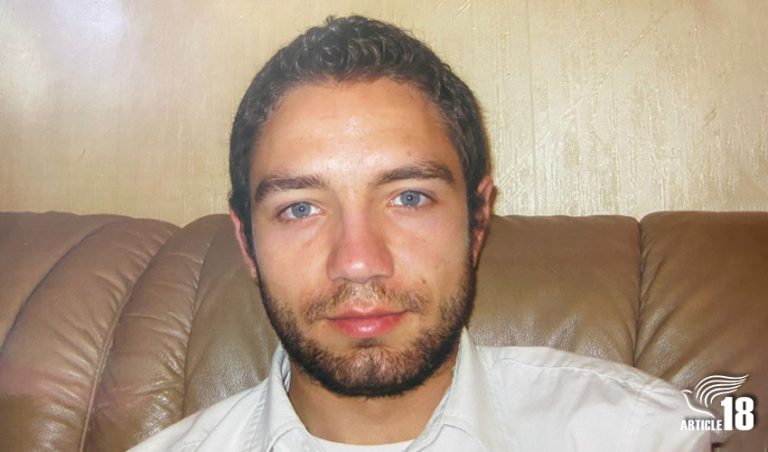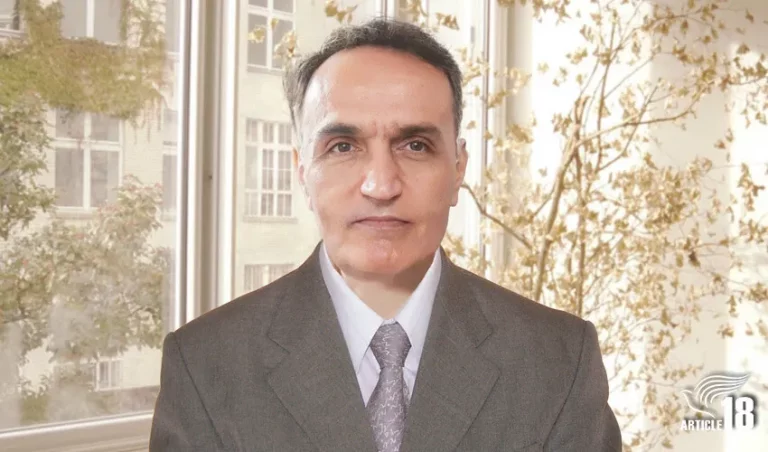
Case referenced by
Article18, IranWire, Middle East Concern, Open Doors, International Christian Concern, Church in Chains, Voice of the Martyrs, Barnabas Fund
Summary
Iranian Christian converts Sara Ahmadi and her husband Homayoun Zhaveh, who has advanced Parkinson’s disease, were sentenced to eight and two years in prison, respectively, for leadership/membership of a house-church. They were arrested in June 2019, sentenced in November 2020, and their appeals were rejected in December 2020. They were first summoned to prison in March 2021, but it wasn’t until August 2022 – after two failed appeals for a retrial with the Supreme Court – that they were finally imprisoned. They were released on 9 May 2023, after a retrial.
Case in full
Iranian Christian converts Homayoun Zhaveh, 62, and his wife Sara Ahmadi, 43, were arrested by agents from Iran’s Ministry of Intelligence on 14 June 2019 as they holidayed with several other Christian families in the city of Amol, near the Caspian Sea.
The other Christians were also questioned, but only Homayoun, who has advanced Parkinson’s disease, and Sara were detained – first in Sari, near Amol, and then in Evin Prison back in their home city of Tehran.
Homayoun was released on bail a month later, but Sara was held for a total of 67 days, including 33 days in solitary confinement – mostly within the Intelligence Ministry’s Ward 209 – during which time she was subjected to extreme psychological torture.
Their hearing took place on 11 November 2020 at Branch 26 of the Revolutionary Court of Tehran, under Judge Iman Afshari.
On 14 November 2020, Judge Afshari sentenced Sara to 11 years in prison for an alleged leadership position within their house-church, and Homayoun to two years for membership of the group.
They were also banned from foreign travel or membership of any social or political group for two years after their release, and given six months’ community service at a centre for the mentally disabled.
On 30 December 2020, appeal-court judge Ahmad Zargar upheld the sentences, but ruled that Sara must serve only the longer sentence of eight years and not also the three-year sentence. (Judge Zargar was enforcing a legal norm in Iran whereby if a person faces two charges of a similar nature, for the same action, only the one with the higher penalty stands.)
Their lawyer had argued in his appeal that the law was “unclear” on how meeting as a group of Christians could be construed as membership of an “illegal organisation”.
“My clients have always insisted that they haven’t engaged in any actions against national security, nor do they harbour any animosity or hostility towards the government,” the lawyer stated, before adding that Homayoun’s condition would prevent him from partaking in any anti-security actions, even were he to wish to do so.
Article18’s advocacy director, Mansour Borji, said: “To hand down a prison sentence to a man of Homayoun’s age, suffering with advanced Parkinson’s – and only because of his membership of a house-church – would be shocking were it not for Iran’s proven track record of systematically persecuting Persian-speaking Christians, regardless of their age, health, or any other reasonable considerations.”
On 21 March 2021, they were summoned to appear at Evin Prison to begin their sentences.
In April 2021, their lawyer applied for a retrial with Iran’s Supreme Court.
Article18’s Mansour Borji said that were the Supreme Court to reject the case, “it would leave the regime with no leg to stand on if they continue to claim that Christians enjoy equal rights and that no-one is persecuted on account of their beliefs in Iran”.
On 16 May 2021, those responsible for securing Homayoun and Sara’s release on bail received a written warning that if they did not appear at Evin Prison within 30 days, the property deeds they had submitted as collateral would be forfeited.
Sara and Homayoun’s bank accounts were then frozen.
On 2 June 2021, Article18 launched a petition, to be delivered to the Iranian embassy in London, calling on the Iranian authorities to “immediately and unconditionally drop all charges against the Sara and Homayoun”.
On 9 June 2021, the couple were notified that the Supreme Court had rejected their appeal for a retrial. A second application was rejected on 24 November 2021.
On 15 June 2021, they presented themselves at Tehran’s Evin Prison to begin serving their sentences, only to be told they could return home.
The next time they answered a summons, on 13 August 2022, the couple assumed they were to be handed back property confiscated from them during their arrest. But instead of this, they were detained and transferred to prison.
Their first two applications for a retrial were rejected, but on 9 April 2023, Easter Day, Branch 9 of Iran’s Supreme Court ordered that their case be reviewed. A month later, on 9 May 2023, Branch 34 of the Tehran Court of Appeal acquitted them and ordered their release. They were released later that same day.
In the ruling, the appeal-court judge said that gathering with people of one’s own faith was “natural”, and having books related to Christianity was “also an extension of their beliefs”.
He added that there was “no evidence” that Sara and Homayoun had acted against the country’s security or had connections with opposition groups or organisations.
“The reports by the officers of the Ministry of Intelligence about organisation of home-groups to promote Christianity, membership, and participation in home-groups, are not considered as acts against the country’s security, and the law has not recognised them as criminal activity,” he said.
Recommendations
Article18 requests that the international community and Christians worldwide:
- Call for the swift application of due process in the cases of all who are detained and/or awaiting charges, trials, sentences or appeal hearings on account of their Christian faith and activities in Iran.
- Western countries should prioritise human rights in negotiations with Iran, especially freedom of religion or belief, and urge the government of Iran to recognise all minority-faith adherents, including converts to Christianity, as full citizens before the law, enjoying their full human rights.
- The international community should hold the Iranian government accountable for failing to uphold its international and constitutional commitments to protect the freedom of Christians in its territories. Closing churches, appropriating church property, arresting church leaders and threatening churchgoers are violations of freedom of religion or belief, as prescribed in Article 18 of the ICCPR, to which Iran is a signatory, without reservation, and therefore legally bound to uphold. Meanwhile, Article 13 of Iran’s Constitution states that Zoroastrians, Jews and Christians are recognised religious minorities, who are free to perform their religious rites and ceremonies. And Article 23 says “investigation of individuals’ beliefs is forbidden, and no-one may be molested or taken to task simply for holding a certain belief.”
Diplomatic involvement
In March 2021, a member of the Irish parliament formally raised concerns over Sara and Homayoun’s case with Ireland’s foreign minister, demanding an official statement on “the treatment of Christians, Baha’i and other religious minorities in Iran, and in particular the recent summons to prison in Tehran of [Sara and Homayoun] for the crime of belonging to a house church”.
In his written response on 1 April, Mr Coveney said “reports on the treatment of Christians, Baha’i, and other religious minorities in Iran are deeply concerning”.
“It is unacceptable to discriminate against individuals on the basis of their religion,” he added.
Mr Richmond told Article18 he welcomed Mr Coveney’s “confirmation that he raised human rights concerns [during a visit to] Iran and that Ireland will use its positions within the EU and on the UN Security Council to further these”.
He added: “The situation in Iran for many is extremely concerning, and there is a duty to partners to raise these concerns.”
Background
There has been a significant increase in human-rights violations in Iran in recent years, and particularly in the persecution of religious minorities, principally of Christians from the Iranian house-church movement.
Ethnic Christian communities (Assyrian and Armenian) are permitted a degree of freedom to worship, although it is illegal for these churches to conduct services in Persian (the national language of Iran and the common language of converts).
Bibles and other Christian literature are also illegal in Persian and those found in possession of such materials, especially in sufficient quantities for distribution, can expect severe treatment and prison sentences. Therefore, the growing community of Christian converts are not permitted to attend recognised churches and they have to gather for worship in secret house-churches, risking arrest and imprisonment.
In the past few years, a number of Christians have been handed down sentences of between 10 and 15 years, charged with offences such as “acting against national security”. These political charges are used to help avoid an international outcry at more clearly religiously-motivated charges such as “apostasy”.
Those detained or charged often have to obtain and hand over exorbitant amounts for bail, which are often forfeited as some choose to flee the country in the knowledge that they are very unlikely to receive a fair trial and just verdict. Those awaiting trial who flee the country are tried in absentia. Many will face a gruelling legal process, and until their case is heard, which could take several years, their lives are in limbo.
The majority of the Christians arrested in the last few years have been released, either after finishing their prison sentences or temporarily released on bail with severe warnings and threats against any further Christian activity. Once released, they are closely monitored, and risk re-arrest and imprisonment if they engage, or are suspected of engaging, in any Christian activity.
Iran is 8th on Open Doors’ 2021 World Watch List of the 50 countries where it is hardest to be a Christian.
Article18’s latest annual report noted that 115 Iranian Christians were arrested last year, though only 52 of those arrests were publicly reported. Meanwhile, two Iranian Christians were flogged for drinking wine as part of Communion, others were denied education or employment, and one couple were told they could no longer retain custody of their adopted daughter on account of their faith. By the end of 2020, 15 Christians were being held in Tehran’s Evin Prison on account of their faith, while two others were living in internal exile and another was imprisoned on a disputed criminal charge.



0 Comments
Trackbacks/Pingbacks